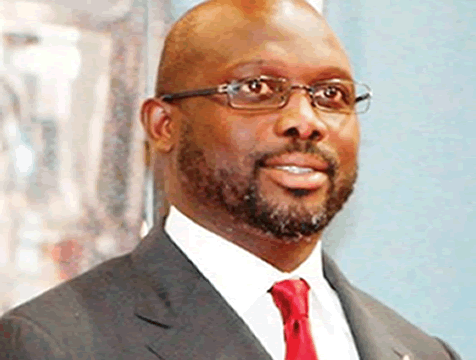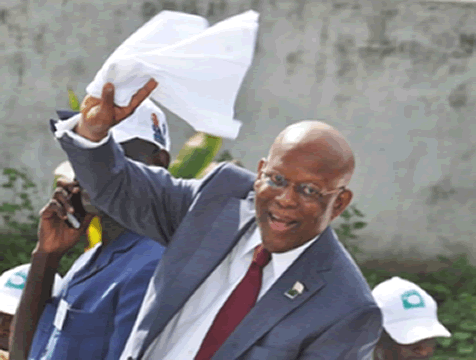
NEWS HEADLINES
PARTISAN DISENCHANTMENT RAISE CHALLENGES FOR HISTORIC LIBERIAN RUN-OFF
By Lindsay Barrett


George Weah (left) and Vice President Jospeh Boakai (right) opponents in Liberia’s second round run-off.
The approach of Liberia’s historic second round of voting in the recently contested presidential election, in which ex-soccer star George Opong Weah laid claim to a seemingly unassailable ten percent lead over incumbent Vice President Joseph Nyumah Boakai at the end of the first round, has now been challenged by several participants in the race. The most surprising aspect of the challenges presented before Liberia’s Supreme Court is the fact that a major complainant is the Unity Party, the party on whose ticket President Ellen Johnson Sirleaf won two terms in office. The party fielded the sitting Vice President as its flag-bearer but surprisingly while Mrs. Johnson Sirleaf vocally pledged her support for his aspiration she took no part in the campaign. Her own explanation for this stance is that she wished the process to be seen as free of official interference but over the weeks leading up to the voting and increasingly since then several commentators in the Liberian press and on social media have accused her of abandoning her party’s Presidential objective. The major issue on which this accusation was based in opinions voiced by some notable observers of the Liberian political arena was the assumption that Mrs. Johnson Sirleaf wished to undermine her Vice President because of some internal disagreements. During the campaign the Vice President’s supporters denied this allegation vehemently and insisted that Madam Johnson Sirleaf was fully in support of their candidate, but since the outcome of the first round most of them have changed their tune.
An important issue that several critics of the Liberianelectoral process had focused on in the run up to the election was the integrity of the National Elections Commission.Several groups questioned the qualification of Jerome George Korkoyawho they alleged to be holding American citizenship, and many of them claimed that he was selected as Chairman by President Johnson Sirleaf to carry out a hidden agenda of her own. In spite of these allegations Korkoya was not removed and many of the contestants gave him the benefit of the doubt before the polls. However since the end of the polls evidence has been offered of incompetence and irregularities on a massive scale in the actual implementation of the process. Several of the major parties have used these to build petitions on which they are challenging the integrity of the outcome that has been announced. Among the most frightening of these accusations are that in some parts of the country several ballot boxes filled with voting records that favoured the Vice President were found buried and discarded.The Liberty Party led by the lawyer Charles Brumskine who came third in the first round of voting led the challenge at the court, and it has now been joined by the ruling Unity Party, the All Liberian Party (ALP), and the Alternative National Congress (ANC). The ALP’s flag-bearer was Benoni Urey a one-time colleague of former warlord Charles Taylor, and now a major businessman who is proprietor of Lone Star Mobile, the MTN concessionaire in Liberia, while the ANC’s flag-bearer was Alexander B. Cummings a former Coca Cola executive, who has actually surprised many observers by announcing that he would support Weah in the second round.

Charles Brumskine the Liberty Party flag-bearer came third in the first round after mobilising a loyal body of youthful voters effectively during his campaign. He initiated the challenge at the Supreme Court which has been joined by the ruling Unity Party and two others.
The complainants at the Supreme Court are all influential figures in the Liberian polity and even though George Weah the leading beneficiary of the first round has withheld any complaints so far many observers have questioned the real provenance of his leadership. The outcome of the first round suggested that he had improved his acceptability among the youth of the nation, especially since nearly 80% of Liberia’s electorate is between eighteen and forty years of age. At the same time he crafted an alliance with Mrs. Jewel Taylor, the ex-wife of Charles Taylor in order to be able to mount a glamorous and very noisy campaign that was based largely on promoting his stardom rather than on any concrete and credible policy objectives being identified by him. In fact Mrs. Jewel Taylor has been the most articulate voice of the ticket and the fact that in early stages of the campaign she had openly claimed that her intention is to lead a government that will restore her ex-husband’s plans for Liberia has unveiled the potential incongruity of the Weah agenda. Liberian analysts have published evidence that the managers of the Weah campaign include some of the operatives of Taylor’s former insurgent institution the NPFL. This aspect of the Liberian political situation has provoked regional concerns because an eventual victory by Weah could lead to a restoration of the fortunes of the remnants of the body that many observers blame for the descent into conflict that devastated Liberia for two decades.
President Ellen Johnson Sirleaf (left) has been accused of abandoning her party the Unity Party and supporting the aspirations of outsiders like Alexander Cummings (right) who has announced his willingness to support George Weah in the second round.
The challenges brought before the Supreme Court refer to the conduct of the elections but the background to the complaints is steeped in disenchantment with President Johnson Sirleaf’s alleged abandonment of the conventions of party loyalty. It is now widely believed by a vast cross-section of the populace that she not only wished to scuttle her Vice President’s chances but also that she may have offered clandestine support to the Weah camp. Some analysts have stated openly that Alexander Cummings’ surprising endorsement of Weah’s aspirations was inspired by President Johnson Sirleaf’s stance on the elections. Although she continues to claim to be maintaining impeccable neutrality some of her family members and allies are regarded as being deeply involved in facilitating the success of the Weah challenge and this perception has taken hold of large portions of the public will in the post-election discourse.
One of the most interesting symptoms of this concern is what has occurred in one of Liberia’s most populous counties, Nimba County. There the first round vote went overwhelmingly to their native son the former warlord Prince Yormie Johnson, a Senator who was notorious during the civil war as the one who supervised and directed the torture and assassination of President Samuel Doe.
He has always been a stalwart opponent of Charles Taylor, so his announcement of support for the Weah/Taylor ticket after the first round came as a major shock. However substantial leaders of the county, including a former Solicitor General and highly respected human rights lawyer Counselor Tiahwan Gongloe, have responded vehemently by warning Johnson that the Nimba people’s consciences were “not for sale”. Political issues and challenges like these indicate that Liberia’s journey towards a historic vote to change its national leadership by democratic means for the first time in seven decades must overcome major obstacles if it is to eventually produce a proper representative of the nation’s best interests.
First published in The Vanguard, Sunday November 5th 2017.
You can contribute to this web journal by sending your commentaries and reports to: info@nreportonline.com